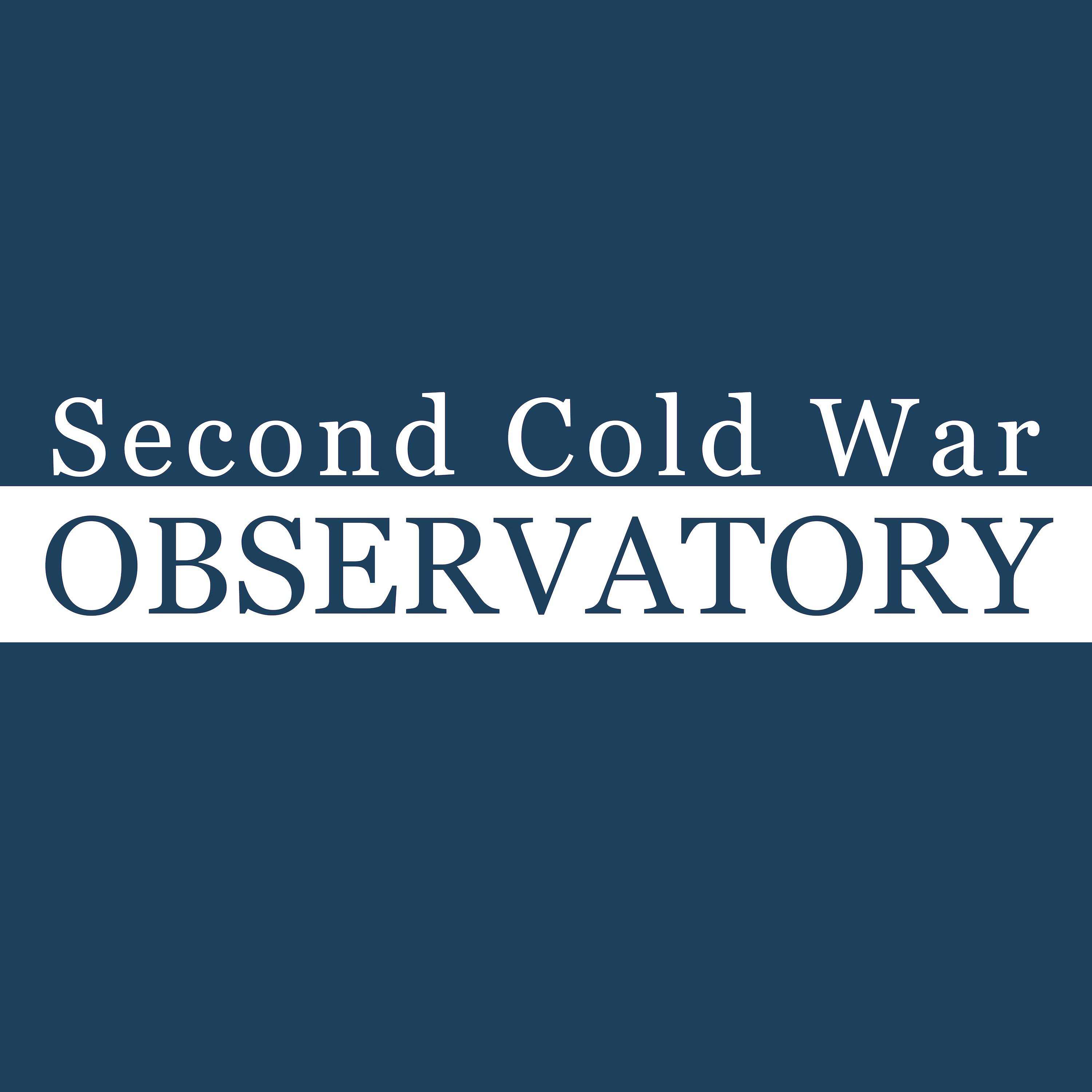The Second Cold War Observatory

The Second Cold War Observatory
Podcast Description
Welcome to The Second Cold War Observatory, where we explore the histories and grounded realities of geopolitical rivalry from the Cold War to the present. We host conversations with academics, policymakers, and activists about how competition affects places, people, and politics around the world to foster more nuanced and open debate on contemporary rivalry. We cover diverse themes from the environment to digital connectivity and finance. Our guests present in-depth research from the institutions and places that become flashpoints of great power rivalry.
This podcast is part of the Second Cold War Observatory, a global collective of scholars committed to understanding how geopolitical and geoeconomic competition influences and is influenced by societies, economies, and ecologies worldwide.
This original podcast series is available on Spotify, Apple, and Buzzsprout.
www.secondcoldwarobservatory.com
Podcast Insights
Content Themes
Explores a range of themes such as geopolitical rivalry, economic competition, environment, digital connectivity, and infrastructure, with episode examples including discussions on India's role in the Second Cold War and China's Belt and Road Initiative's impact on global infrastructure.

Welcome to The Second Cold War Observatory, where we explore the histories and grounded realities of geopolitical rivalry from the Cold War to the present. We host conversations with academics, policymakers, and activists about how competition affects places, people, and politics around the world to foster more nuanced and open debate on contemporary rivalry. We cover diverse themes from the environment to digital connectivity and finance. Our guests present in-depth research from the institutions and places that become flashpoints of great power rivalry.
This podcast is part of the Second Cold War Observatory, a global collective of scholars committed to understanding how geopolitical and geoeconomic competition influences and is influenced by societies, economies, and ecologies worldwide.
This original podcast series is available on Spotify, Apple, and Buzzsprout.
www.secondcoldwarobservatory.com
Lithium, a crucial input in the batteries powering electric vehicles, has the potential to save the world from climate change. But even green solutions come at a cost. Mining lithium is environmentally destructive. We therefore confront a dilemma: Is it possible to save the world by harming it in the process?
Having spent over a decade researching mining and oil sectors in Latin America, Thea Riofrancos is a leading voice on resource extraction. In this episode, we discuss her 2025 book Extraction: The Frontiers of Green Capitalism, in which she draws on groundbreaking fieldwork on the global race for lithium. Taking readers from the breathtaking salt flats of Chile’s Atacama Desert to Nevada’s glorious Silver Peak Range to the rolling hills of the Barroso Region of Portugal, the book reveals the social and environmental costs of “critical minerals.” She takes stock of new policy paradigms in the Global South, where governments seek to leverage mineral assets to jumpstart green development. Zooming out from lithium, we also discuss the evolving geopolitics and geoeconomics of energy transition, critical minerals, and green technology supply chains.
—
Thea Riofrancos is an Associate Professor of Political Science at Providence College, a Strategic Co-Director of the Climate and Community Institute, and a fellow at the Transnational Institute. Her research focuses on resource extraction, climate change, the energy transition, the global lithium sector, green technologies, social movements, and the Latin American left. She explored these themes in her book, Resource Radicals: From Petro-Nationalism to Post-Extractivism in Ecuador (Duke University Press, 2020), peer-reviewed articles in Cultural Studies, World Politics, and Global Environmental Politics, and her coauthored book, A Planet to Win: Why We Need a Green New Deal (Verso Books, 2019). Her essays have appeared in outlets including The New York Times, Financial Times, The Washington Post, Foreign Policy, The Guardian, and more. Thea’s latest book, which we discuss on this episode, is Extraction: The Frontiers of Green Capitalism (W.W. Norton 2025).
Extraction: The Frontiers of Green Capitalism (W.W. Norton 2025)
The Security–Sustainability Nexus: Lithium Onshoring in the Global North in Global Environmental Politics 2022
Resource Radicals: From Petro-Nationalism to Post-Extractivism in Ecuador (Duke University Press, 2020)
A Planet to Win: Why We Need a Green New Deal (Verso Books, 2019)
Learn more about your ad choices. Visit megaphone.fm/adchoices

Disclaimer
This podcast’s information is provided for general reference and was obtained from publicly accessible sources. The Podcast Collaborative neither produces nor verifies the content, accuracy, or suitability of this podcast. Views and opinions belong solely to the podcast creators and guests.
For a complete disclaimer, please see our Full Disclaimer on the archive page. The Podcast Collaborative bears no responsibility for the podcast’s themes, language, or overall content. Listener discretion is advised. Read our Terms of Use and Privacy Policy for more details.